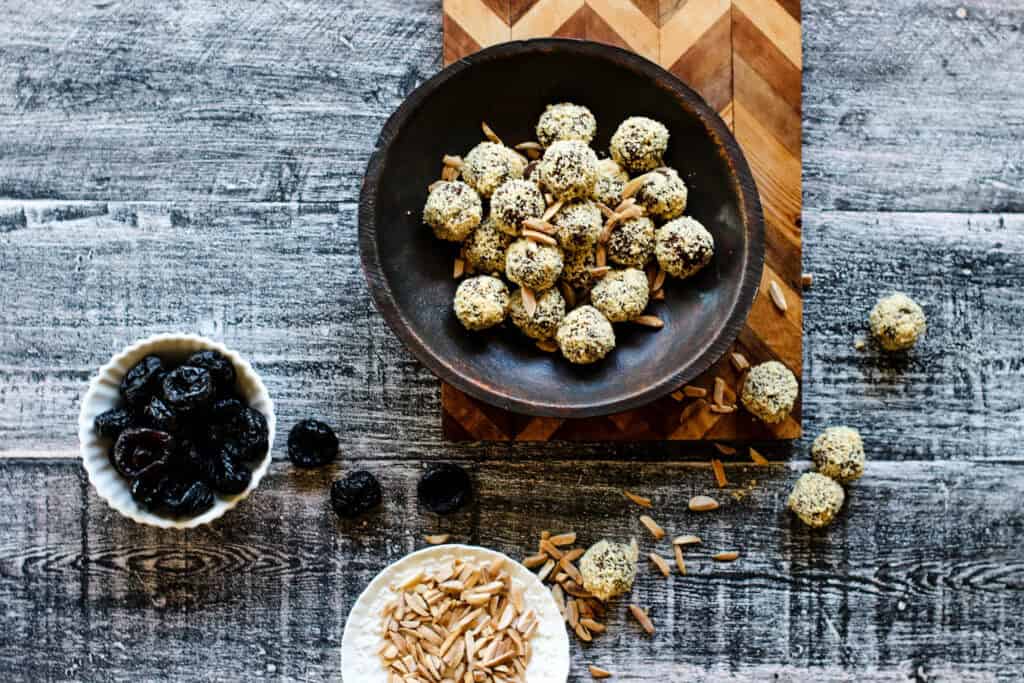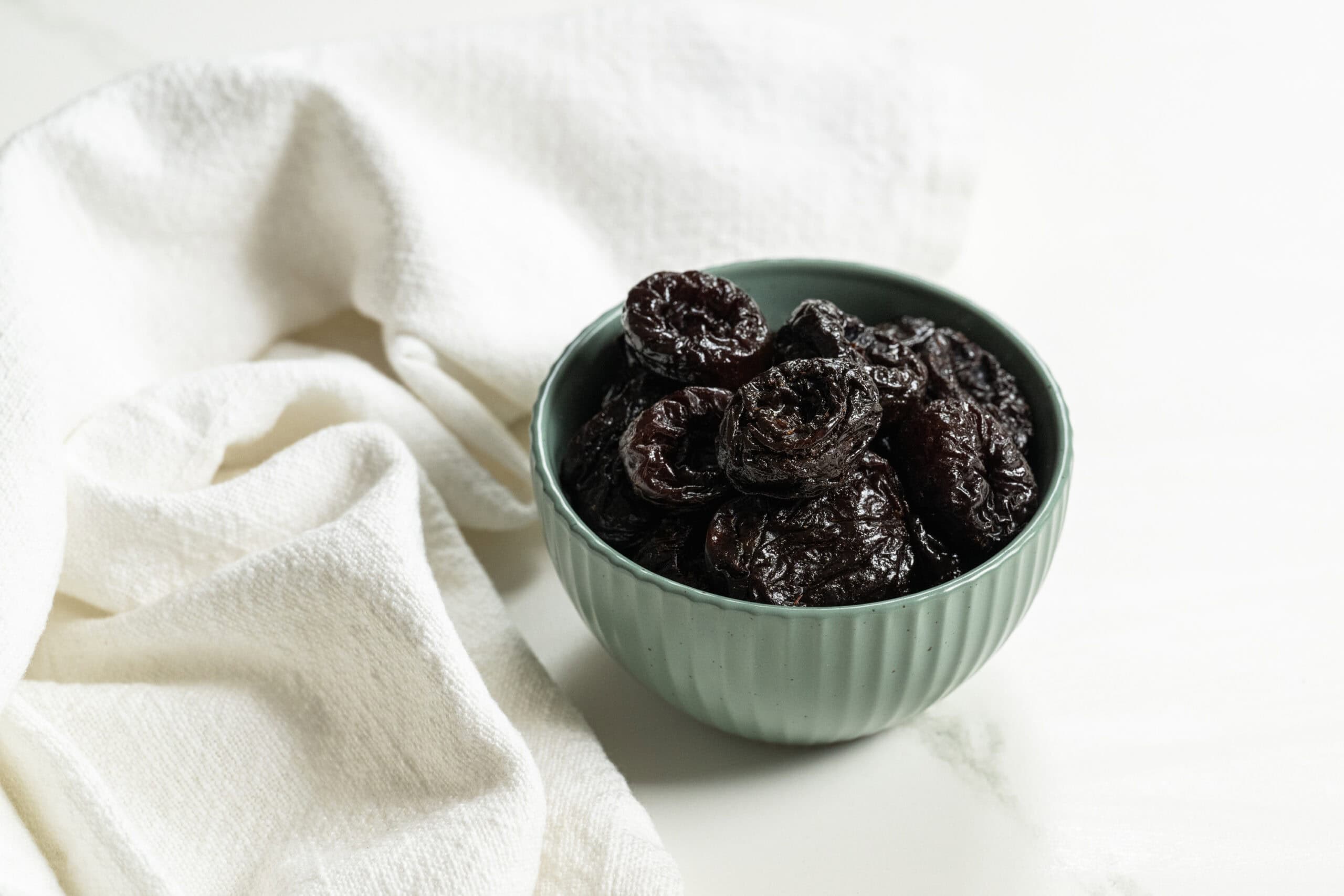
The #1 Food to Eat For Better Gut Health
Gut health is trending! If you haven’t jumped on the gut health bandwagon, by the end of reading this piece, I’m confident you will.
What is Gut Health?
Gut health, or the health of your gastrointestinal tract (GI for short), is very important when it comes to total body health. Your gut is home to your microbiome, or a fancy way of saying the trillions of microorganisms, like bacteria, that live within it. These microorganisms have a huge impact on how your entire body functions. Not only has research linked gut health to cognitive health and mood, but also heart health, weight management, diabetes development, bone health, immune health, digestive health, nutrient status and more!1
As you can see, taking care of your gut health is crucial for optimum health. In this article I’ll help guide you through the evolving science on gut health (in an easy to digest fashion), while sharing what the top food nutrition professionals recommend to eat, regularly, for better gut health.
A Closer Look at Why Gut Health Matters
Having tummy troubles? Feeling tired, irritable, a bit on edge? How about illness? Have you been hit with colds more often than you can count this year?
If either of these situations sound familiar, it’s time to take a closer look at your gut health. From housing your immune system to helping regulate your mood, there’s very little your GI tract isn’t involved in when it comes to keeping your body running in top shape. In fact, gut health is such an important topic in the nutrition field that science is continuing to discover new avenues it impacts.
Case in point, longevity. A recent 2023 study published in Nature Aging found that centenarians, or those who live to 100, consumed more dietary fiber and as a result had a microbiome that resembled that of a younger adult.2 Plus, it does not require any heavy lifting. Seeing these microbiome benefits is as simple as adding more high fiber foods to your diet. This is something most of us will likely benefit from instantly given fiber is a nutrient of public health concern not being consumed in sufficient quantities according to the Dietary Guidelines for Americans.3
The #1 Food to Eat For Better Gut Health
Thankfully, I have good news! You don’t have to overhaul your lifestyle overnight to set yourself on a path to improve your gut health. Instead, you can focus on adding this one food first. It’s tiny, but mighty, and has a dark purple beautiful hue that resembles something grand… It’s prunes!
Of the many foods on the market touted to promote gut health, California prunes are one of the originals. While you may know them for their short-term digestive health benefits (like getting things moving when you need to go number two), they’re also a powerhouse when it comes to supporting your gut health long term. Let’s explore why.
Nutrition of Prunes
A standard serving of prunes is about four to six prunes, approximately 38 grams, or ¼ cup. In this condensed package, you’re getting a plethora of nutrients your body needs to thrive. Just look at the nutrition facts!
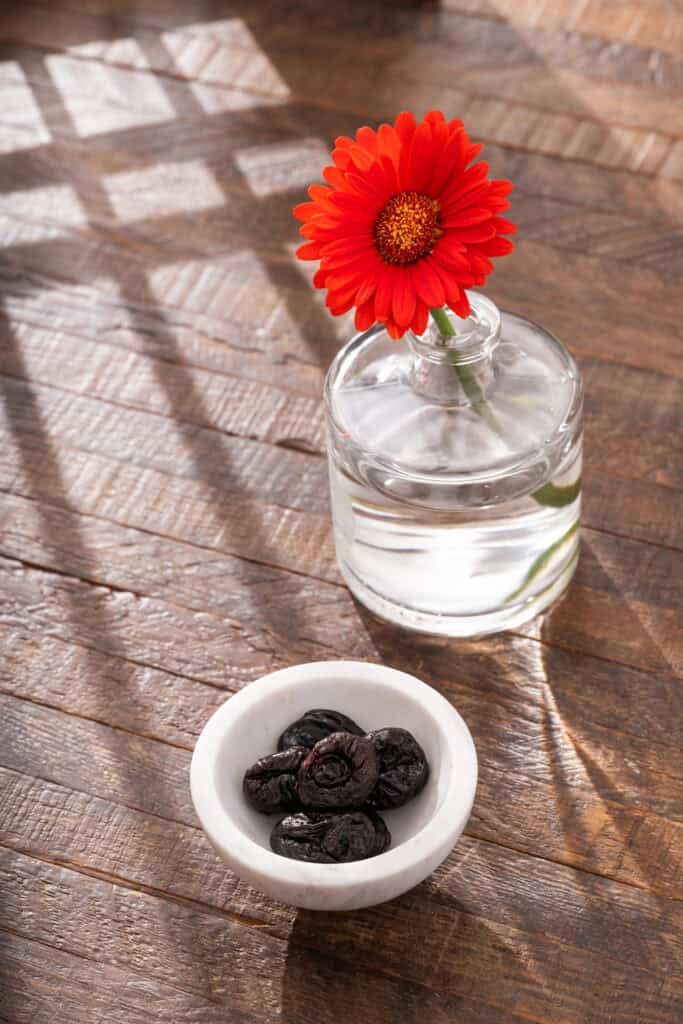
Calories: 90
Total Fat: 0 g
Cholesterol: 0 g
Sodium: 0 g
Total Carbohydrates: 24 g
Dietary Fiber: 3 g / 11% daily value
Total Sugars: 14 g
Added Sugars: 0 g
Protein: 1 g
Vitamin D: 0
Calcium: 20 mg / 2% daily value
Iron: 0.4 mg / 2% daily value
Potassium: 280 mg / 6% daily value
Plus, in addition to being a good source of dietary fiber, prunes are also an excellent source of vitamin K (an important nutrient to maintain healthy bones), a good source of copper (an important mineral needed to build connective tissue), and contain polyphenols (antioxidants), vitamin B6 (an energy vitamin) and boron (a trace element).4,5,6
Scientists are exploring how this particular group of nutrients in prunes, including their fiber and polyphenol content, may work together to support gut health through improving digestion and your microbiome. And, they have some good news! Prunes are a one-size-fits-all food that you can incorporate at any age and life stage to see their gut health benefits.
The Nutrients In Prunes That Impact Gut Health
Every individual has a unique microbiome. While genetics certainly play a role in the makeup of this ecosystem, scientists have found diet and lifestyle can also impact your microbiome. Let’s take a closer look at how specific nutrients found in prunes can help you get the most out of your dietary choices to positively influence gut health.
Fiber
Consuming adequate dietary fiber is a cornerstone of building a healthy gut. Dietary fiber comes in two forms, soluble and insoluble. Soluble fiber mixes with water in the gut and helps slow digestion. This type of fiber has been found to help decrease one’s risk of heart disease, reduce cholesterol and support blood sugars.7 Some grains, seeds, legumes, vegetables, and fruits, like prunes, contain this type of fiber. Insoluble fiber adds bulk, meaning it mixes with food and waste in the body, allowing them to pass through the gut more easily. Foods like grains, beans, root vegetables, and fruits, like prunes, contain these. As you can see, many foods often contain a blend of the two forms of fiber.
Research shows eating a variety of high fiber foods is important for gut health since everyone’s microbiome is different and certain fibers act differently within each individual.8 But, there is no need to get into the nitty gritty here worrying about what fiber you SHOULD eat (because again, most of us aren’t eating enough anyways). Instead, focus on what decades of research have proven regarding the health benefits of dietary fiber and start adding a blend of fibers into your regular routine.9 Since prunes offer both insoluble and soluble fibers, they make a great addition to your diet.
The Biotics
Known as both prebiotics and probiotics, the biotics’ are crucial to a healthy microbiome. Prebiotics are the fibers found in plant foods that serve as fuel for probiotics, or the bacteria that live in the gut as well as those present in specific fermented foods. Prunes have been found to be a source of prebiotics, meaning they offer food for the good guys (probiotics) in your gut.
Consuming prebiotics on a regular basis helps to foster growth of probiotics in your gut (a win-win for your total body health.) Plus, research has found that prebiotics may also help increase calcium absorption (another win for bone health), improve immune health, decrease pathogenic bacteria populations, decrease allergy risk, as well as improve gut permeability.10 Given gut health is still so popular in research, it’s only a matter of time until more good news is seen when it comes to nourishing your gut health with the biotic duo.
Antioxidants
Antioxidants are a category of compounds, or phytonutrients, that help support total body health by kicking free radicals (or the bad guys that can interfere with how your body is supposed to run) to the curb. That beautiful dark purple hue that gives prunes its signature color is due to their antioxidant content, mainly, polyphenols. Anthocyanins, flavonoids and resveratrol are the three polyphenols found in the dark purple/blue fruits and vegetables that offer protective effects. Interestingly, research has found that prunes contain more polyphenols than most other fruits.11
Polyphenol activity has protective effects against inflammation, including inflammation that can occur in your gut. Research has found that polyphenol activity in the diet can positively influence the body’s tissue against damage and offer protection.12 These powerful compounds influence the gut microbes, and in turn, the gut microbes act with the polyphenols to release bioactive metabolites that offer the anti-inflammatory, antibacterial and neuroprotective benefits.13 Pretty cool, right?
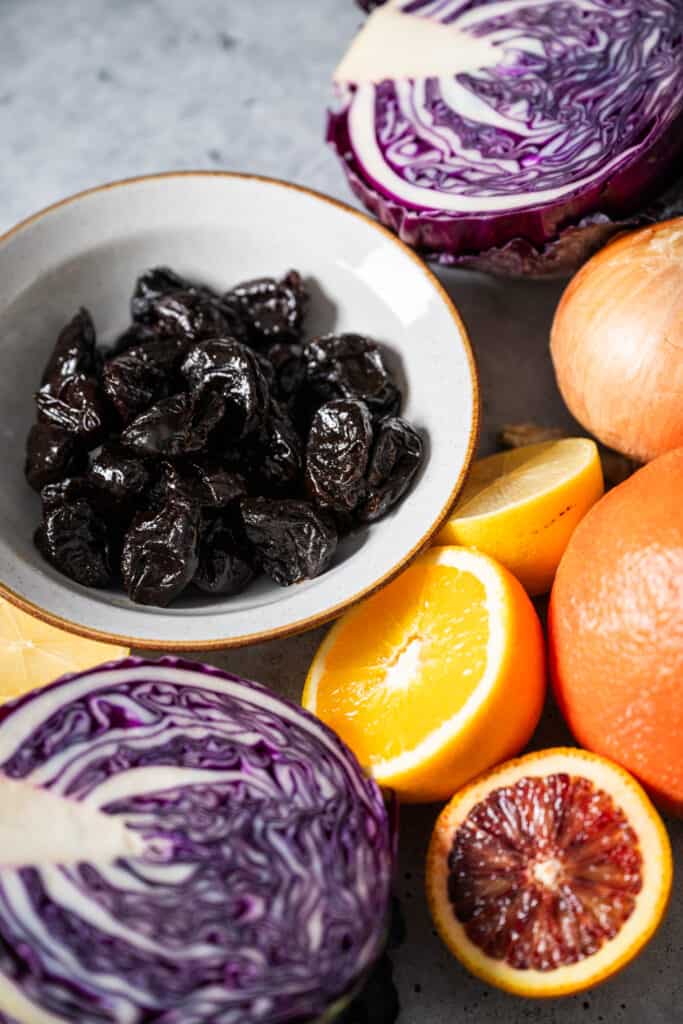
Adding a handful of prunes to your routine can supply your body with more of these good-for-you polyphenols daily!
Sugars
Last but not least, let’s address the white elephant of the room; the sugar content of prunes. Yes, a serving of prunes does have a high total sugar content (with approximately 14 grams). But this is naturally occurring sugars, meaning there is no added sugars in prunes. The sugar is coming from natural sources, one of which is a naturally occurring form of sorbitol, a type of sugar alcohol. This type of sugar alcohol in prunes has been shown to relieve constipation and improve stool consistency, potentially improving gut health.14,15
Plus, prunes (thanks to the natural sugar make-up) are considered low on the glycemic index, with a score of 29, meaning they are less likely to raise blood sugars in comparison to a food like white bread or glucose (simple sugar) when consumed in the same quantity. To get the most staying power from prunes, dietitians recommend pairing them with a protein and fat source. For instance, the carbohydrate in prunes complement protein and fat, like the protein found in Greek yogurt and healthy fat in chopped walnuts, hitting all three macronutrients in one mini meal!
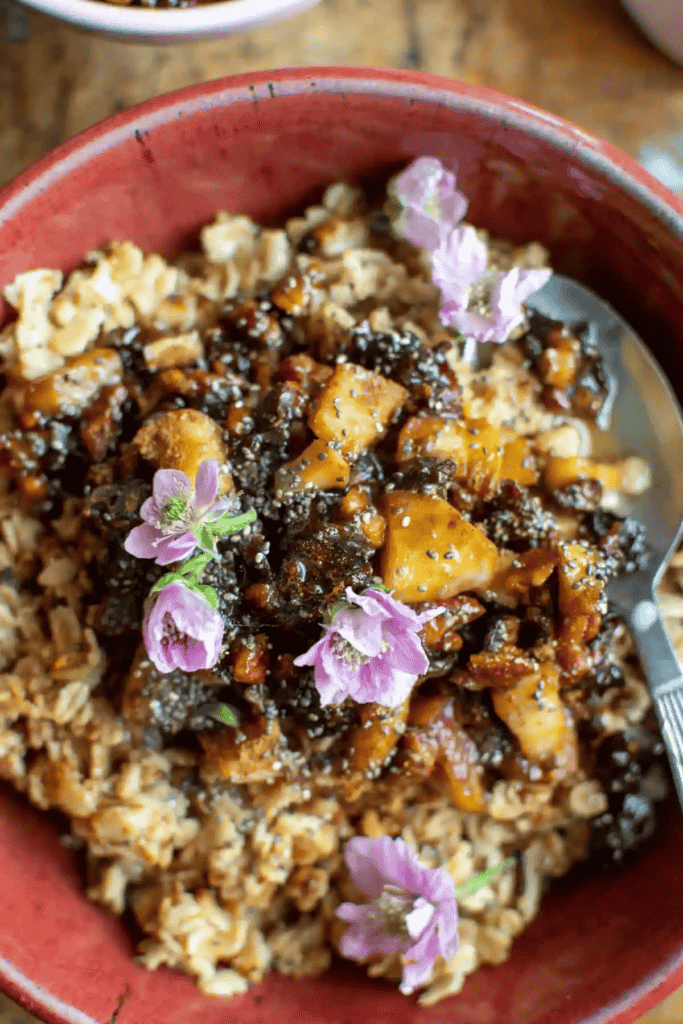
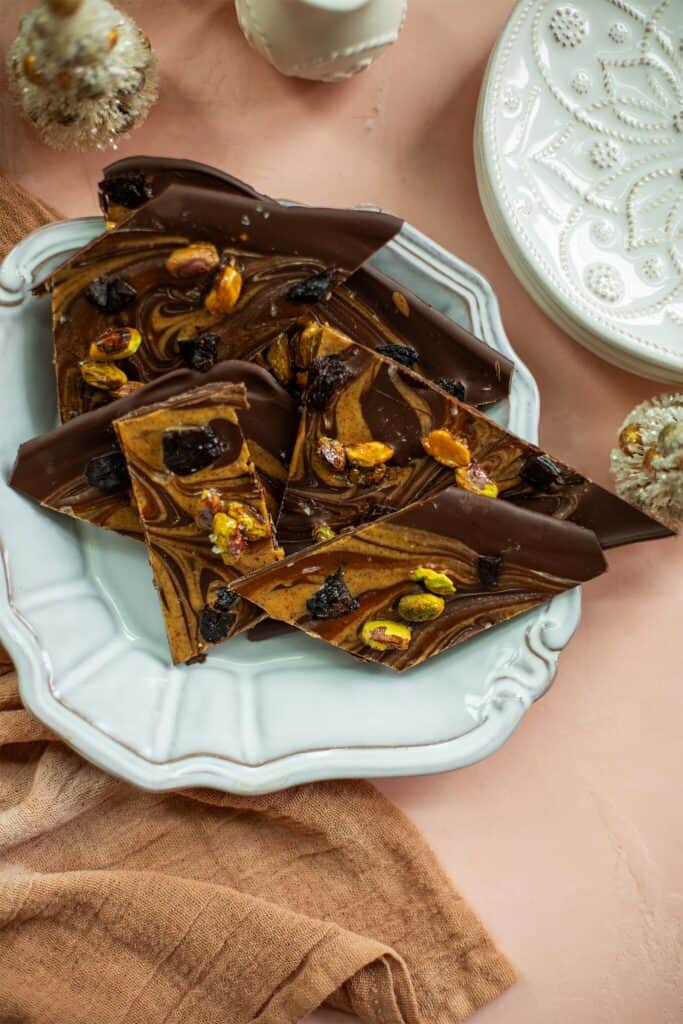
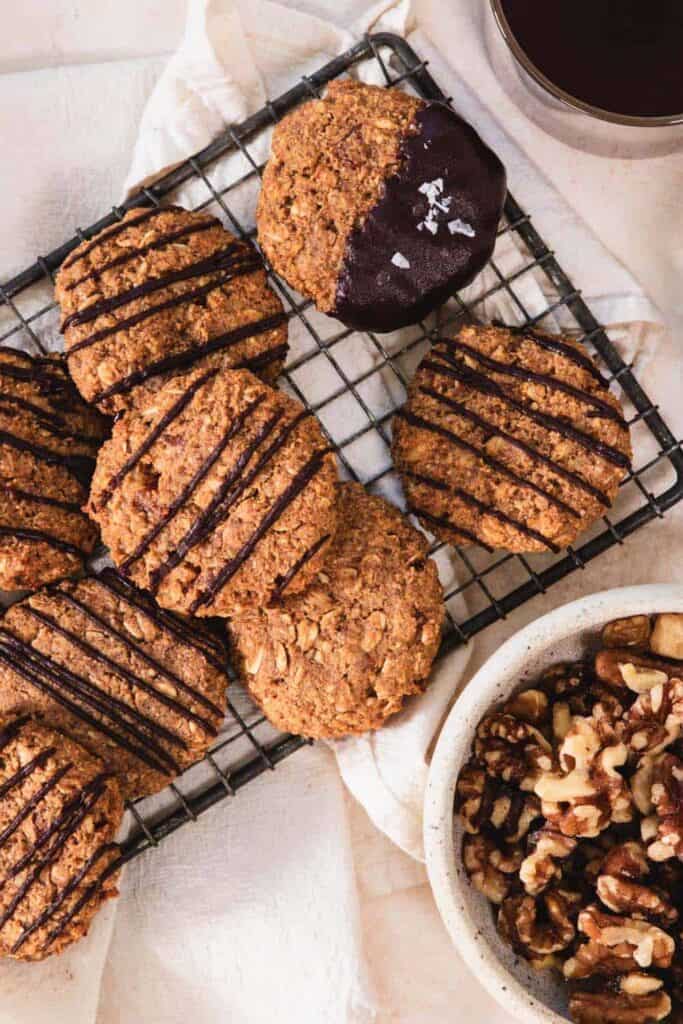
Incorporating Prunes into Your Diet
Prunes are underestimated. We may be biased, but they are arguably one of the most versatile fruits to use in recipes. Do you like to bake? Then enlist the help of California Prunes to offer a natural sweetener in your baked goods. Prefer savory? No problem. Enhance savory dishes with the addition of California Prunes to yield a complex yet subtle taste of sweetness. Whether you’re a pro in the kitchen and can come up with a recipe on a whim, or need a little hand holding with a set recipe, you can certainly rest easy knowing prunes will be there to support wherever your culinary adventures take you while providing a punch of nutrition along the way.
Plus, prunes are fat-free, cholesterol-free, sodium-free and free of added sugars, making them a staple when you want to add a big bite of nutrition in whatever you’re serving up. Whether you’re new to adding prunes to your diet or are in need of innovative ways to use them, here are a few fan favorites I think you’ll enjoy too.
How can I add prunes into my diet?
- Puree prunes to use in recipes. Prune puree is so versatile. Plus, it makes an excellent swap in desserts to lower the added sugar content while boosting the nutrient content of a typically low nutritive item. Follow this recipe to make your own and use to upgrade your breakfast with these High Fiber Breakfast Cookies.
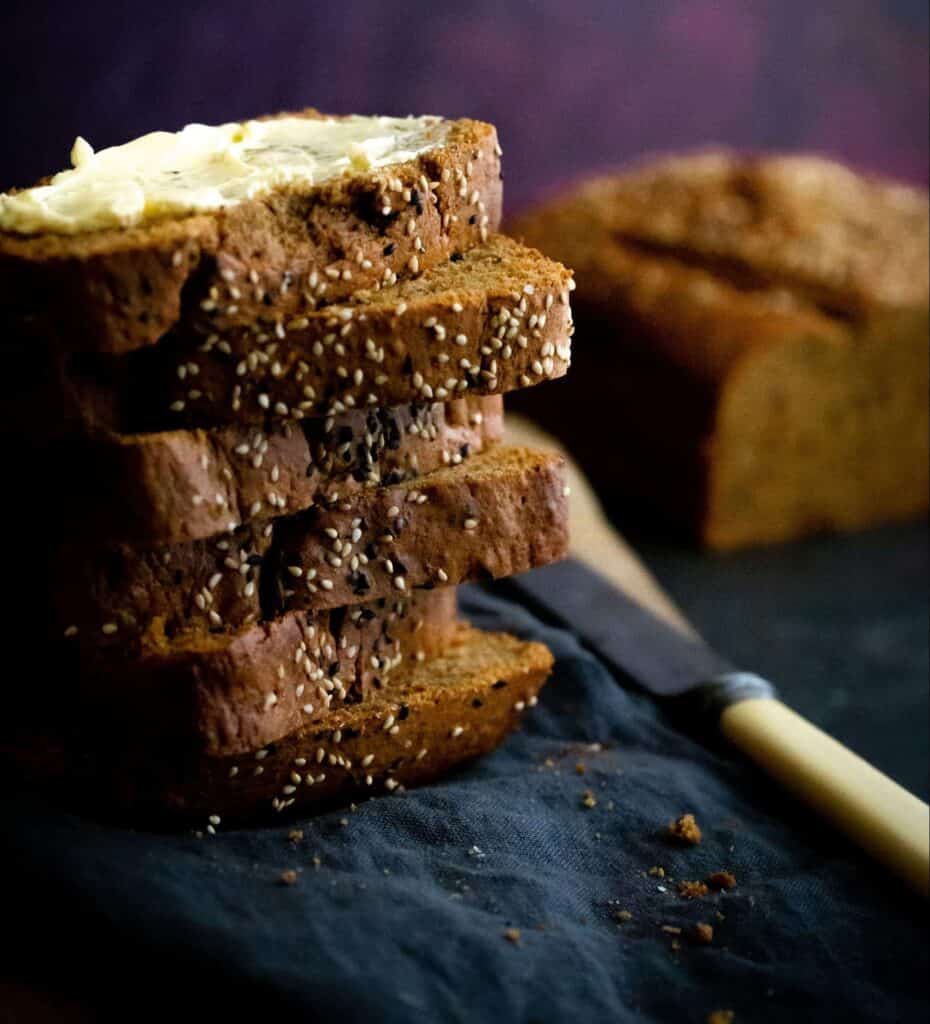
Chop prunes for an easy add to baked goods and main meals. Looking to elevate your recipe mainstays with new texture and flavor? Then a handful of chopped prunes and pistachios make a great addition. Experiment with prunes to upgrade classics, like banana bread and cinnamon oatmeal, or serve them up in your tacos!
Use them in your desserts. Upgrade the nutrition of your favorite sweet treats by including prunes in them. This fun twist on chocolate bark packs major flavor and a bit more nutrition thanks to the addition of California Prunes. Or, toss them into your smoothies for a nutrient-dense boost to every sip.
- Enjoy them a la carte. Prunes are great on their own, but to offer more staying power with your snack, pair them with a partner like walnuts or almonds. These nuts provide a healthy dose of fat and a bit of protein to help keep you fuller for longer between meals.
- Stock up on prune juice. Yes, we are big believers in prune juice too. In fact, prune juice works wonderfully in many recipes while still offering that good-for-you nutrition you’ve come to know and love. Try prune juice in your baked goods, smoothies, or even as a flavorful addition to your marinades.
What This Means For You
Instead of spending your money on the latest gut health supplement, as a dietitian, I encourage you to think twice and instead add nutritious whole foods, like prunes, into your routine. Whether you want to eat them from the package or utilize them in a recipe, both will allow your gut to reap their nutritional benefits and support the health of your microbiome for years to come. Get started today by whipping up a spin on your childhood favorite with our PB and Prune Smoothie, or venturing into the savory side with a simple Fettuccine Pasta with Prunes, Prosciutto and Black Pepper.

About Liz Shaw
Liz is a registered dietitian known for her expertise in nutrition and wellness. With a passion for helping individuals achieve their health goals through practical and sustainable dietary changes, Liz combines evidence-based nutrition science with personalized coaching. She is also an accomplished author, speaker, and media contributor, frequently sharing her insights on healthy eating, meal planning, and the benefits of a balanced diet. Liz’s approachable style and dedication make her a trusted resource in the field of dietetics.
Sources:
1. Conlon MA, Bird AR. The impact of diet and lifestyle on gut microbiota and human health. Nutrients. 2015 Dec 24;7(1):17-44.
2. Pang S, Chen X, Lu Z, et al. Longevity of centenarians is reflected by the gut microbiome with youth-associated signatures. Nat Aging. 2023;3(4):436-449. doi:10.1038/s43587-023-00389-y
3. United States Department of Agriculture. Dietary Guidelines for Americans. Accessed on July 11, 2024. https://www.dietaryguidelines.gov/.
4. National Institute of Health. Office of Dietary Supplements. Vitamin K. Accessed on July 10, 2024. https://ods.od.nih.gov/factsheets/VitaminK-Consumer/.
5. National Institute of Health. Office of Dietary Supplements. Copper. Accessed on July 10, 2024. https://ods.od.nih.gov/factsheets/Copper-Consumer/.
6. National Institute of Health. Office of Dietary Supplements. Boron. Accessed on July 10, 2024. https://ods.od.nih.gov/factsheets/Boron-HealthProfessional/.
7. National Institute of Health (NIH). Health benefits of dietary fibers vary. Accessed on July 12, 2024. https://www.nih.gov/news-events/nih-research-matters/health-benefits-dietary-fibers-vary.
8. Lancaster SM, Lee-McMullen B, Abbott CW, et al. Global, distinctive, and personal changes in molecular and microbial profiles by specific fibers in humans. Cell Host Microbe. 2022;30(6):848-862.e7. doi:10.1016/j.chom.2022.03.036
9. Menni C., Jackson M.A., Pallister T., Steves C.J., Spector T.D., Valdes A.M. Gut microbiome diversity and high-fibre intake are related to lower long-term weight gain. Int. J. Obes. 2017;41:1099–1105.
10. Carlson JL, Erickson JM, Lloyd BB, Slavin JL. Health effects and sources of prebiotic dietary fiber. Curr Dev Nutr. 2018;2(3):nzy005. Published 2018 Jan 29. doi:10.1093/cdn/nzy005
11. 7 Piga A, Del Caro A, Corda G. From plums to prunes: influence of drying parameters on polyphenols and antioxidant activity. J Agric Food Chem. 2003 Jun 4;51(12):3675-81.
12. Wang X., Qi Y., Zheng H. Dietary Polyphenol, Gut Microbiota, and Health Benefits. Antioxidants. 2022;11:1212.
13. Ray SK, Mukherjee S. Evolving Interplay Between Dietary Polyphenols and Gut Microbiota-An Emerging Importance in Healthcare. Front Nutr. 2021 May 24;8:634944.
14. Koyama T, Nagata N, Nishiura K, Miura N, Kawai T, Yamamoto H. Prune juice containing sorbitol, pectin, and polyphenol ameliorates subjective complaints and hard feces while normalizing stool in chronic constipation: a randomized placebo-controlled trial. Am J Gastroenterol. 2022;117(10):1714-1717. doi:10.14309/ajg.0000000000001931
15. Zoi Katsirma, Eirini Dimidi ORCID logo, Ana Rodriguez-Mateos ORCID logo and Kevin Whelan. Fruits and their impact on the gut microbiota, gut motility and constipation. Food & Function. 2021 Aug; 12, 8850-8866.
